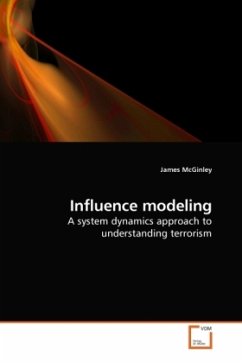This research examines influence as a dynamic process of attitude change either in support of or in opposition to terrorism and violent extremism. It utilizes system dynamics modeling techniques (i.e., causal loop mapping) to conceptualize and depict the associated activities that generate or erode support according to cause and effect relationships. Utilization of a system dynamics approach overcomes the limitations of linear approaches and allows the incorporation of dynamic, complex interrelationships, either instantaneous or delayed, that drive attitude formation and behavior. This exploratory research presents a descriptive influence model that visualizes cause and effect relationships that shape support both for and against terrorism and violent extremism. Conclusions are drawn regarding the interrelatedness of counterterrorism and counter-insurgency approaches as policy options.
Bitte wählen Sie Ihr Anliegen aus.
Rechnungen
Retourenschein anfordern
Bestellstatus
Storno








